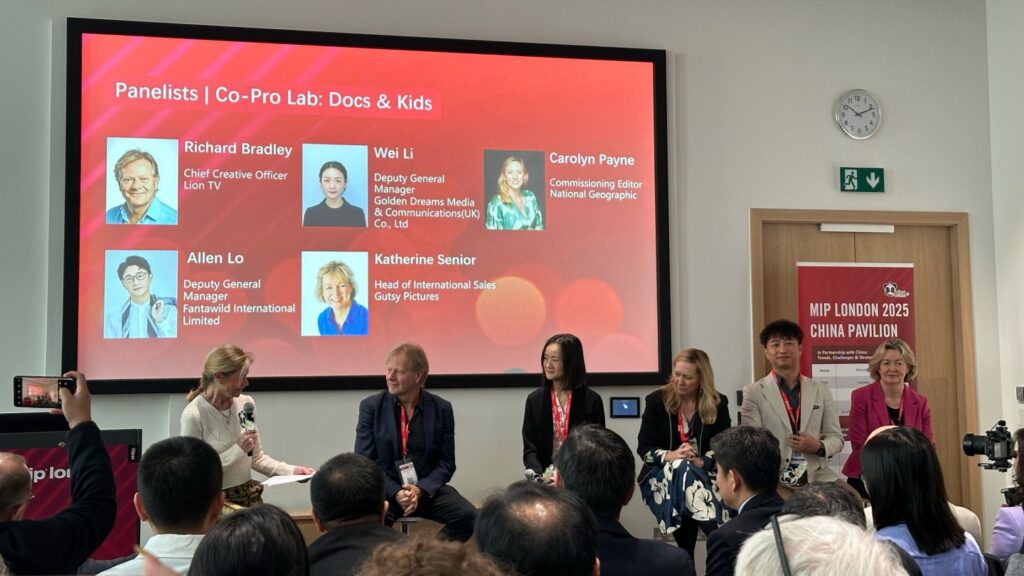China and collaborations with Chinese partners in the TV space were in the focus at MIP London on Tuesday as a session entitled “In Partnership With China: Trends, Challenges & Strategies” explored opportunities and hurdles. Among the topics mentioned were the famous Terracotta Army, a philosophy program, and romantic comedies.
“Here in the U.K., we are now engaged in the co-production of documentaries. Richard (Bradley)’s Lion TV is our great partner,” Li Wei, deputy general manager, Golden Dreams Media & Communications (U.K.), said during a panel. “We have worked on at least five documentaries together. Right now we are working on a very exciting new project. It is about the two greatest minds in the history of East and West, Socrates and Confucius.”
There are certain challenges for it, she acknowledged. “It is not easy, we have to admit, because how (do you) tell the audience about philosophies, about minds on screen?” she shard. “It’s not easy, but our two teams are working very hard on it, and we are confident that before the end of the year, you will see it on a major international channel.”
About the approach to the project, she added: “We are really working together to build a bridge between our two very different cultures. Of course, there are a lot of similarities in our cultures and civilizations, but there are also differences, and we try to build this bridge to help the global audience understand these two great civilizations and appreciate each other’s cultures.”
Carolyn Payne, commissioning editor at National Geographic, touched on things that are not easy. “One of the challenges is trying to find more topics,” she explained. “There’s only so much programming we can shoot in China because the deal with (a local partner) is that things have to be shot in China. There are only so many subjects that we know a global audience is going to come to.”
Meanwhile, Jun Zhang, general manager at Yulele Film (Hong Kong) is in London looking for collaborators, sharing that he is always looking for content with “a uniquely Chinese setting but universal themes to speak to viewers universally.” Right now, for example, he shared “I’m working on an epic TV series about Chinese history and looking for global co-production partners.”
There are some key focus topics. “One (area) is history and archeology. So we constantly make shows about the Terracotta Warriors and the Great Wall, because we know our audience will come to those,” she explained. “But we’re always looking for what’s new. What’s the cutting edge of engineering or space, or what other subjects can we shoot in China that a global audience will come to?”
Katherine Senior, head of international sales at Gutsy Pictures, said her team is always looking for universal themes for kids’ shows. “Humor is very important in kids’ programming, but it also has to have universal themes of kindness, friendship, etc, and an adventure as well,” she explained. “Comedy is becoming more important than action right now. We had a lot of action, and it’s moving more to sort of light-hearted.”
Allen Lo, deputy general manager at Fantawild International, the producer behind the Chinese animated hit franchise Boonie Bears, highlighted that it is “one of the most popular family entertainment brands from China” that has also seen distribution globally. “We are here (because) actually, we do want to find something that we can work on together,” he told the MIP TV audience.”
Avi Armoza, CEO of Armoza Formats, highlighted how key partnerships with Chinese companies are to ensure success. “You need to work on co-developing and adapting (formats) to the Chinese market. You don’t just sell the format,” he explained. “You take the format and co-develop it with the Chinese partner to adapt it to the local market” and its taste and needs. “It’s a long process, getting to know each other, building the trust, and also understanding the complexity of the regulation in China. Because in China, television is based on regulations that change every few months, every year. And you need to follow this regulation in terms of the type of content to adapt to the local culture.”
Roy Lu, general manager at Linmon Media International, touted the success of the firm’s drama series Nothing but Thirty, about three vastly different urban women in their 30s, which has received six local-language versions, including in Japan and South Korea. But his team is still looking for adaptation opportunities in the European and North American markets, he said.
“On top of that, we’re also looking at smaller-scale romantic stories, especially rom-com,” he said. “Romantic comedy stories make a lot of sense to the marketplace. … It works pretty well everywhere.”
Read the full article here
















